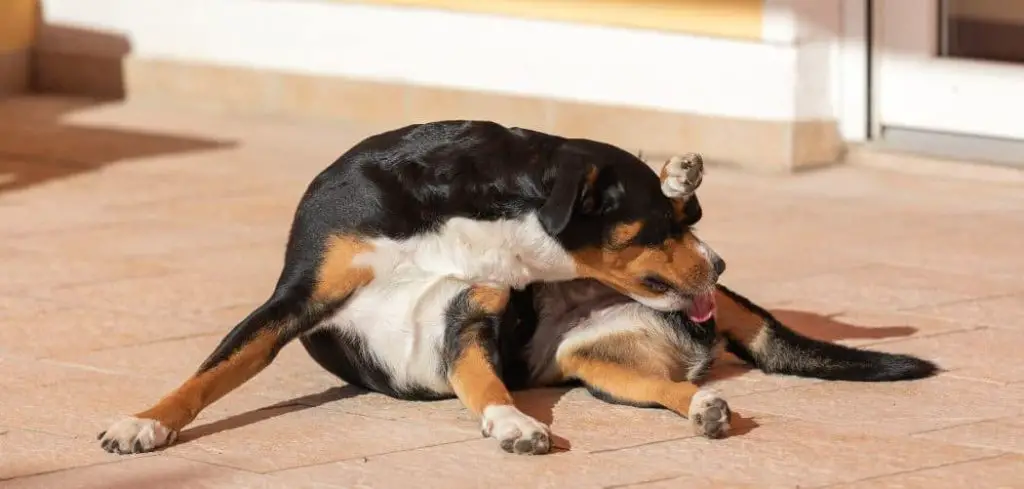If a dog is constantly licking its bottom, it can be distressing to watch and may signal something more serious than just an itch.
Persistent licking often points to discomfort or an underlying health problem that needs attention.
We outline the common reasons a dog may constantly lick its bottom, what you can do at home, and when to seek veterinary help.
Table of Contents
Dog Constantly Licking Bottom — Why It Happens
Dogs may constantly lick their bottoms due to irritation, discomfort, or medical issues that need addressing. Anal gland problems, skin infections, allergies, intestinal parasites, or even pain from injury can all trigger this behavior.
Sometimes, what seems like a harmless habit may actually be a red flag for something more serious affecting your dog’s health.

Dog Constantly Licking Bottom: Common Causes
Anal Gland Problems
One of the most common reasons a dog licks its bottom is due to anal gland issues.
Dogs have two small glands located on either side of the anus that produce a smelly fluid. When these glands become impacted or infected, they can cause irritation and pain.
Pet owners may notice their dog scooting across the floor, licking excessively, or even whimpering when sitting.
Anal gland problems can worsen quickly, leading to abscesses or infections if untreated. This is a key cause to consider if your dog cannot seem to leave its bottom alone.
Read more: Dog Constantly Licking Paws (When you should be concerned)
Intestinal Parasites
Worms, particularly tapeworms, can cause itchiness around a dog’s rear. Segments of tapeworms often appear around the anus, creating irritation that leads to licking.
Other parasites like roundworms or whipworms can also cause discomfort in the digestive tract, which may prompt bottom licking.
Dogs with worms might also lose weight, develop a dull coat, or show changes in appetite. Parasite infections need veterinary treatment and can worsen if ignored.
Skin Allergies
Allergies are another frequent trigger for dogs licking their bottoms. Food sensitivities, flea allergies, or environmental allergens can cause itchy skin, particularly around sensitive areas like the anus.
When the skin becomes inflamed or itchy, licking may offer temporary relief but often worsens irritation over time.
Secondary infections can also develop, making the problem more uncomfortable for the dog.
Infections (Bacterial or Yeast)
Sometimes, dogs develop bacterial or yeast infections in the folds of skin around their anus. These infections can cause redness, swelling, and a foul odor.
Licking is often a dog’s way of trying to soothe the discomfort, but it usually makes the problem worse.
Left untreated, infections can spread and become more painful, requiring medical attention.
Rectal or Anal Tumors
Though less common, growths around the anus can lead to constant licking. Tumors may cause swelling, pain, and a feeling of pressure, prompting a dog to lick persistently.
Any unusual lumps or bumps in this area should be checked by a veterinarian promptly.
Tumors can range from benign growths to malignant cancers, and early detection makes treatment more effective.
Pain or Irritation from Injury
Sometimes, the cause is as simple as irritation from an injury or foreign object. A small cut, insect bite, or even grass seed lodged in the area can make a dog lick repeatedly.
If licking starts suddenly after a walk or outdoor play, it’s worth checking for signs of injury or debris.
While minor wounds may heal with proper cleaning, persistent licking should not be ignored as it can worsen irritation.
What to Do If Your Dog Is Constantly Licking Its Bottom
If your dog is licking its bottom constantly, start by checking for visible signs of swelling, redness, or worms. Gently lift the tail and look for discharge, irritation, or foreign objects. Keeping the area clean with a pet-safe wipe can sometimes provide temporary relief.
For mild anal gland irritation, increasing dietary fiber may help some dogs express their glands naturally. Pumpkin or a fiber supplement (under veterinary guidance) can be useful.
Regular parasite prevention is essential, so make sure your dog is up to date with deworming and flea control. These simple steps can prevent many cases of itching and licking.
Avoid letting your dog lick excessively, as this can make irritation worse. Using an Elizabethan collar (cone) may help prevent self-trauma while the underlying cause is addressed.
When to Call or Visit Your Vet
Seek veterinary help if your dog’s licking does not improve within a day or two, or if you notice other concerning signs. Swelling, bleeding, pus, or a strong odor are red flags for infection or anal gland abscesses.
If your dog is scooting across the floor, losing weight, showing signs of pain, or has visible worms, a vet visit is necessary. Parasite infections and anal gland problems need professional treatment.
Any visible lumps, persistent bleeding, or sudden worsening of symptoms should be considered urgent. These could indicate tumors or severe infection requiring immediate care.
Even if the problem seems minor, persistent bottom licking is rarely just a harmless habit. Getting a veterinary diagnosis ensures your dog gets relief and prevents complications.
Read more: Dog Constantly Licking Lips (Possible causes explained)
Key Takeaway
A dog constantly licking its bottom is usually trying to tell you something is wrong. While it may be caused by minor irritation, more serious issues like anal gland problems, infections, parasites, or even tumors can be the root cause.
Owners can help by keeping the area clean, ensuring parasite control, and monitoring for other signs. But when licking persists or worsens, a veterinary checkup is the best step.
Caring for your dog means paying attention to small behaviors that may signal discomfort. By acting early, you can bring relief and protect your dog’s overall health.
